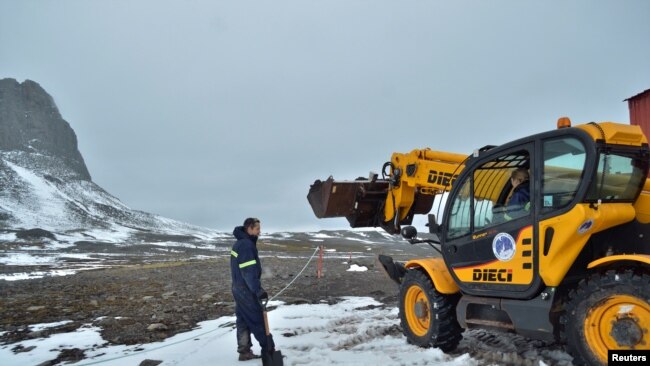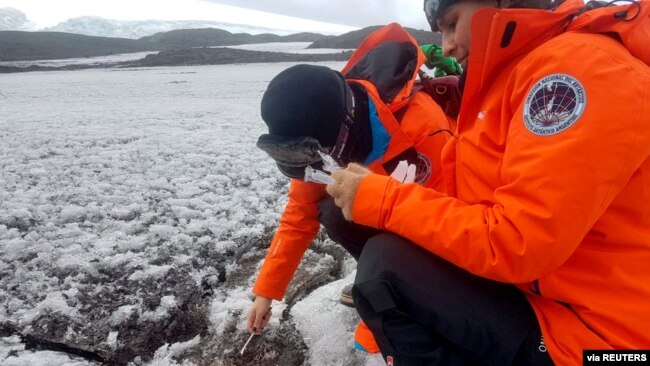微生物から治療薬を見つけられ、ノーベル生理学・医学賞を受賞された大村智氏が頭に浮かびました。
この記事も自然界にいるものに、何一つ無駄なものはないのだということを改めて教えてくれています!!
人間もそういう生物であリたいものです。
この分野、私には日常用語ではないので覚えてもすぐ忘れてしまいます。
VOAは何度も教えてくれます。苦手分野へ目を向けさせてくれます。
さぁ、VOAで今日も英語を学びましょう、生物の力に期待しましょう!!
アルゼンチンの科学者たちが、汚染を食い止める生物を調査(和訳)
Argentinean Scientists Investigate Pollution-Eating Organisms
アルゼンチンの科学者たちは、南極大陸で発見されたプラスチックやディーゼル燃料などの汚染物質を浄化するのに役立つかもしれない微生物について、より深く理解するために取り組んでいます。
この微生物は、燃料やプラスチック廃棄物などの汚染物質を食べると考えられています。この研究結果は、より広い範囲の環境問題に役立つ可能性があります。
科学者たちは、南極大陸に生息するバクテリアと菌類であるこの生物が、より温暖な気候でも機能するかどうかを調べる作業を行っています。
科学者たちは、この微生物が、南極の研究基地で熱源や電力源としてよく使用されているディーゼル燃料から生じる廃棄物を消化できることを発見しました。
科学者たちが南極大陸の汚染を減らそうとするのには理由があります。南極大陸は、1961年に制定された 良好な状態に保たれている場合にのみ研究に使用できる というルールによって保護されているのです。
ルーカス・ルベルト博士は、この研究に携わる生化学者です。彼によると、南極の土壌に生息する生物は、炭化水素の汚染物質を食べて分解することができると言います。
ルベルト博士と他の科学者は、12月にカルリーニ研究基地に行きました。チームはバイオレメディエーション– 何かを自然の状態に戻すこと– に関連した作業を実施しました。ディーゼル燃料の影響を受けた土壌を、在来の微生物や植物を使って浄化したのです。
南極の温暖な季節に使用できるこのプロセスで、土壌中の汚染物質の60〜80%が除去されることがわかりました。ルベルト博士は、土壌の状態を改善するために、窒素、湿度、空気の流れを加えることで微生物を助けたといいます。
「基本的には、この方法によって、微生物が生物学的に、環境への影響を最小限に抑えながら、汚染物質のレベルを下げることができるのです」とルベルト氏はロイター通信の記者に話します。汚染物質とは、ある物質を使用に適さなくするものです。
科学者たちは現在、この微生物が他の場所でのプラスチック廃棄物の浄化にどのように役立つかについて研究しようとしています。燃料もプラスチックもポリマーです −主に炭素と水素からなる分子。
研究者たちは、南極大陸に生息する微生物がプラスチック廃棄物を食べることができるかどうかを調べています。南極海からプラスチックの破片を採取し、微生物がプラスチックを”分解”しているかどうかを調べているのです。
ナタリー・ベルナール氏は、プラスチックの生分解の専門家です。「もし、本当にプラスチックを分解していることがわかれば、次のステップは、それがどのように行われるかを理解することです」と彼女は言います。
長期的な目標は、微生物が世界の他の地域でプラスチックや燃料の汚染を浄化するのに役立つようなプロセスを作ることだと彼女は付け加えました。
Argentinean Scientists Investigate Pollution-Eating Organisms
Scientists from Argentina are working to understand more about microorganisms found in Antarctica that may be able to help clean up pollutants like plastic and diesel fuel.
The scientists believe the very small organisms eat pollution left behind by fuel and possibly plastic waste. The study results could be useful for wider environmental issues.
The scientists are working to find out if the organisms –bacteria and fungi native to Antarctica – can also work in warmer climates.
The scientists found that the microorganisms can digest the waste created by diesel fuel, which is a common source of heat and electricity at research bases in Antarctica.
Scientists have a reason for wanting to reduce pollution in Antarctica. The continent is protected by a rule created in 1961 that says it can be used for research only if it is left in good condition.
Dr. Lucas Ruberto is a biochemist working on the study. He said the organisms that live in the Antarctic soil can eat and break apart hydrocarbon pollution.
Ruberto and other scientists went to the Carlini research base in December. The team carried out tasks related to bioremediation – or returning something back to its natural state. They cleaned soil affected by diesel fuel by using native microorganisms and plants.
The scientists found that the process, which can be used during Antarctica’s warm season, removed 60 to 80 percent of pollutants in soil. Ruberto said the team helped the microbes by adding nitrogen, humidity and air flow to improve soil conditions.
"Basically with that we get the microorganisms to biologically reduce, with a very low environmental impact, the level of contaminants," Ruberto told Reuters reporters. A contaminant is something that makes a substance no longer suitable for use.
The scientists are now trying to research how the microbes could help clean up plastic waste in other places. Both fuels and plastics are polymers – molecules made up of mainly carbon and hydrogen.
The researchers are looking into whether the microorganisms native to Antarctica can eat plastic waste. They are collecting pieces of plastic from Antarctic waters and looking to see if the microbes are “degrading” – or breaking down -- the plastic.
Nathalie Bernard is an expert in plastic biodegradation. She said, “If we find that it is indeed degrading plastic, the next step would be to understand how it does that.”
The long-term goal, she added, is to create a process in which microorganisms can help clean up plastic and fuel pollution in other parts of the world.
Words in This Story
diesel – n. a type of fuel used in engines
humidity – n. a measure of moisture in the air
impact – n. an influence or effect on something

